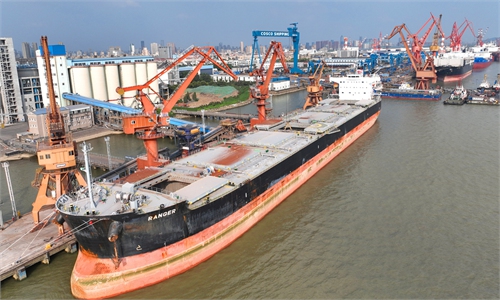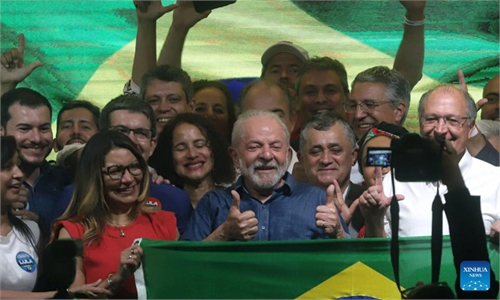China and Latin America have more and more common languages despite political changes in those countries
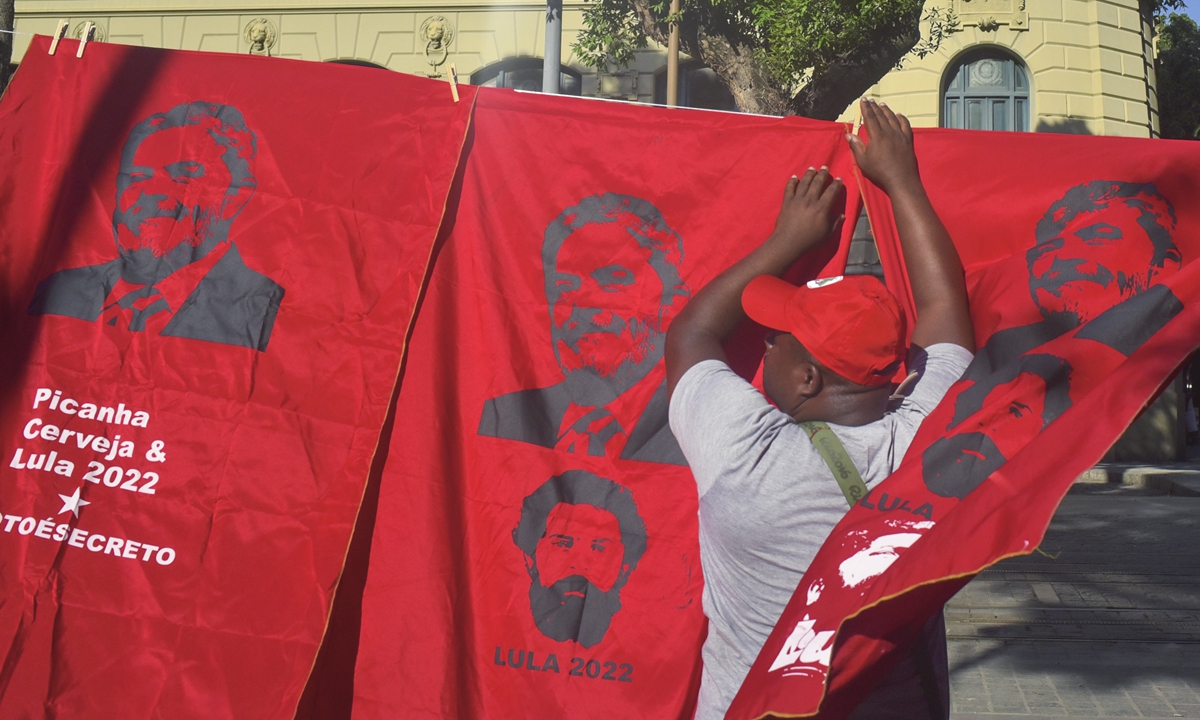
A vendor sells merchandise supporting Luiz Inacio Lula da Silva during the runoff presidential election at Cinelandia Square in Rio de Janeiro, Brazil in October 2022. Photo: VCG
As Luiz Inacio Lula da Silva makes an extraordinary comeback to the Brazilian presidency and is expected to formally assume office on January 1, 2023, Latin America is now experiencing a "pink tide" resurgence with major countries in the region "turning left."
Leading up to Lula's victory, leftist candidates swept into presidential victory in major countries in Latin America including Mexico, Argentina, Colombia, Peru, Chile and Bolivia, in the last four years. In the next year, the left will rule most of Latin America.
Some believe that Latin America will soon usher in a "pink tide" climax, while other analysts believe this is just the metaphorical opposite swing of a political pendulum that may change in the future.
Xu Shicheng, a research fellow at the Institute of Latin American Studies at the Chinese Academy of Social Sciences, told the Global Times that Lula's election victory marks the collective "left turn" of Latin America's largest countries, which has a positive impact on the political ecology of Latin America as well as economic and trade development among the countries.
John Kirk, professor emeritus of Latin American studies at Dalhousie University, Canada, wrote on news agency Al Jazeera that the return of left-wing governments in the region is a clear indication of region-wide rejection of US policies.
"Leftist governments have now made a comeback because the right-wing governments that took over from the left parties - largely supported by the US - had failed to appreciate the tides of popular frustration. The new generation of regional political leaders rejects the traditional US role in the region, but it also has other interests," Kirk said.
He pointed out that the region is also learning to live with foreign investments, "but increasingly from China and not from the US."
Experts noted that China and Latin American countries have huge potential for economic cooperation with numerous tangible benefits, especially under the framework of the China-proposed Belt and Road Initiative (BRI).
A new tendency
A resident in Mexico City spoke highly of the left-wing ruling government's performance during the epidemic.
She told the Global Times that "Andrés Manuel López Obrador's government has made great efforts and purchased vaccines developed and produced by China and other countries to ensure that we were vaccinated in time during the epidemic. This move effectively prevented the spread of the epidemic in Mexico and saved the economy."
Throughout the epidemic, China has provided millions of vaccine doses to Latin American countries including Mexico when the vaccines were the most needed.
López Obrador is the first leftist president in Mexico in seven decades. His supporters said that the government has actively transformed the economy and cracked down on corruption, thus winning widespread recognition. Some people, however, expressed disappointment that the safety in the country has not much improved.
Due to the government's high approval rate, Mexican Foreign Minister Marcelo Ebrard and Mexico City Mayor Claudia Sheinbaum, both members of the ruling National Regeneration Movement party, are top contenders for the 2024 presidential election.
As big economies like Mexico in the region witness the return of leftist parties, some have linked the region's latest leftward turn to a similar "pink tide" in the 2000s, when leaders including Lula pooled money into welfare programs and lifted millions out of poverty.
But analysts have pointed out that the situation is now more complicated given the bleak economic situation facing the region.
Xu told the Global Times that the ruling leftist parties now face mounting challenges. "Due to the global economic downturn, the COVID-19 pandemic and geopolitical conflicts, Latin American countries continue to experience declining fiscal revenue, rising unemployment, high inflation, and widening income gaps," he said.
The main reasons for "turning left" in Latin America are the economy, security, and social order. From the perspective of local people, they are more concerned about steady economic growth and stability, Li Haidong, a professor from the Institute of International Relations at the China Foreign Affairs University, told the Global Times.
The tendency also means increased US-oriented opposition from Latin American countries. These countries will show more independence and nationalism in their diplomacy, Li said.
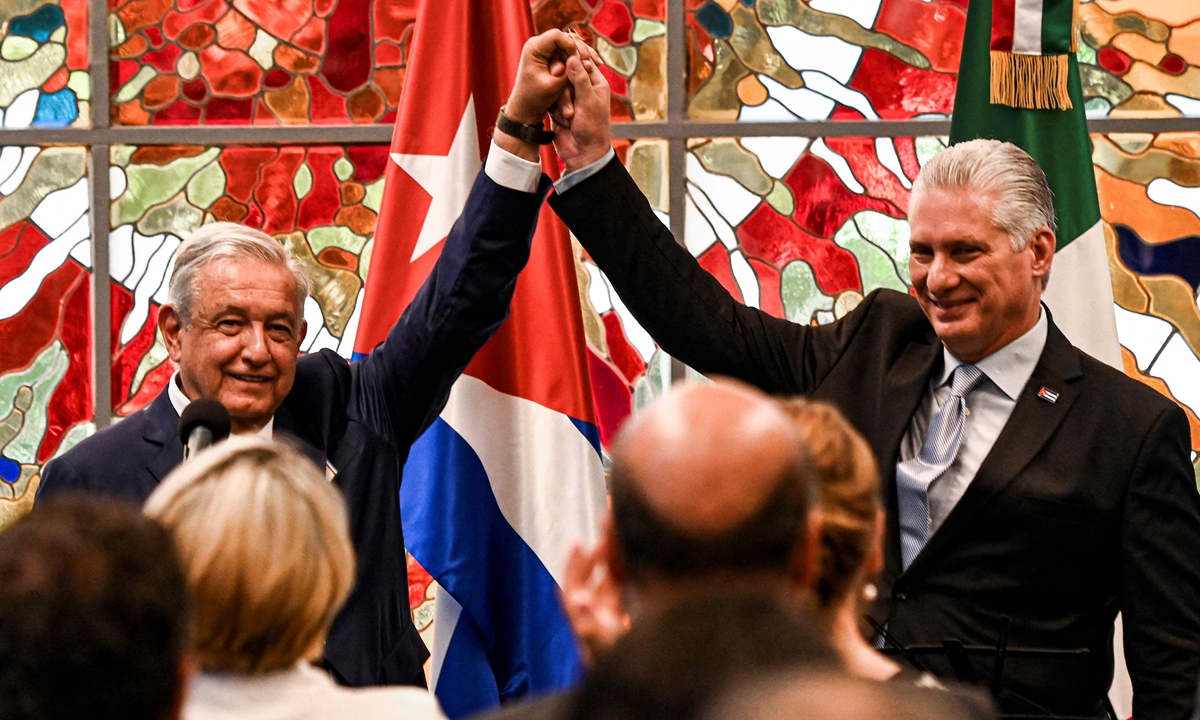
Cuban President Miguel Diaz Canel and his Mexican counterpart Andrés Manuel López Obrador raise their hands before signing bilateral agreements in Havana on May 8, 2022. Photo: VCG
Facing various challenges
However, left-wing governments in different Latin American countries are "very different." Analysts pointed out that there are many differences in Latin American left-wing governance, not just in economic policies but also in other issues.
Economic restoration and improved standards of living are common voter concerns and primary implementation goals for left-wing ruling parties in Latin America. Some countries face high rates of unemployment, inflation, and international debt, with limited fiscal policy flexibility, analysts said.
In response to high inflation induced by the Russia-Ukraine conflict, central banks around the world have adjusted interest rates to historically high levels, causing suppressed investment and consumption.
"People's livelihoods are the key factor in determining who will rise to power, whether left-wing or right-wing. Therefore, employing a pragmatic moderate approach is a common choice," Liu Jia, a research fellow on international relations at the University of International Business and Economics in Beijing, told the Global Times.
He indicated that one of the most significant problems faced by most left-wing governments in Latin America after taking office is how to consolidate enough political goodwill to drive economic growth in divided societies.
Moreover, left-wing governments typically face mounting and intensifying opposition. Although left-wing parties are in power in more and more countries, most were unable to score large-margin election victories, and face difficulties gaining large parliamentary majorities.
Practical choice in diplomacy
The rapid rise of a fresh "pink tide" wave has resurrected the issue of Latin America's regional integration.
Mexican President López Obrador has taken the lead in the "boycott" of the US-hosted Summit of the Americas without the participation of Cuba, Nicaragua, and Venezuela, and has publicly criticized NATO's Ukraine policy.
However, some analysts also believe that left-wing parties in Latin America are not monolithic. The new generation of young, diverse, de-ideological Latin American left-wing politicians might further exacerbate existing social divisions, giving the promotion of American value a chance to thrive.
Xu believes that the vast majority of Latin American countries have always held a friendly and cooperative stance toward China, with some countries expressing their sincere admiration for China's achievements in eradicating absolute poverty and advancing economic development, inspiring them to more passionately take part in the Belt and Road Initiative.
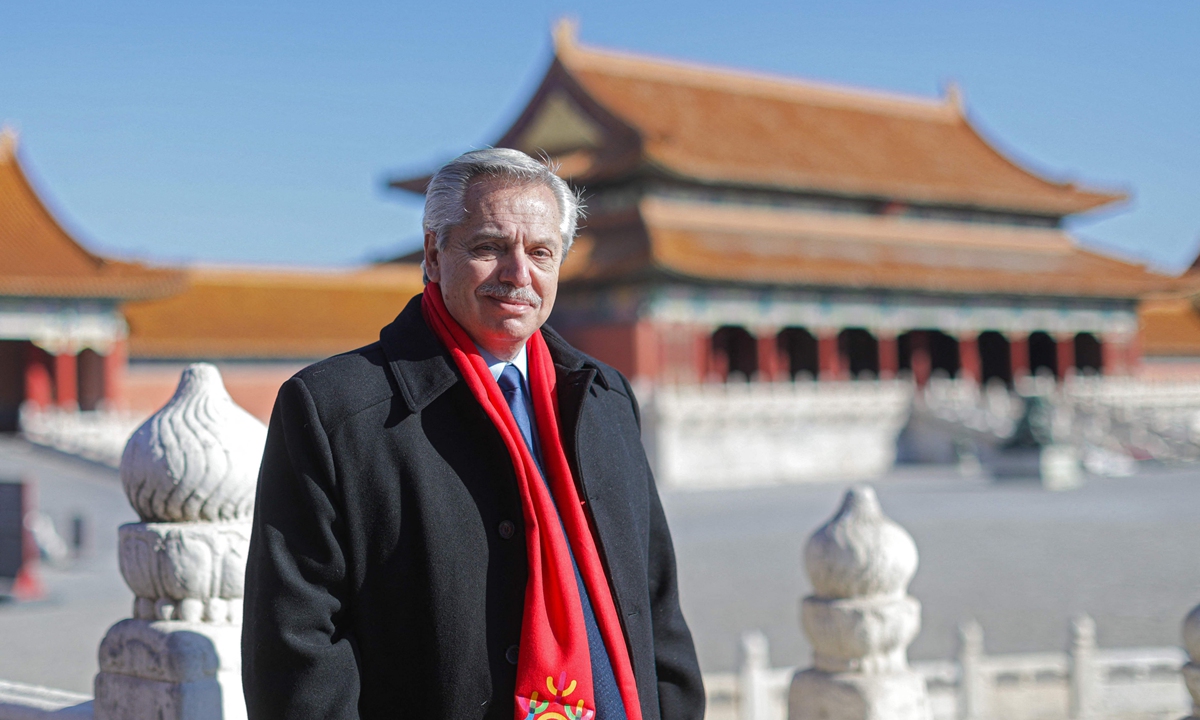
Argentinian President Alberto Fernandez visits the Forbidden City in Beijing on February 5, 2022. Photo: VCG
As the US remains a greatly influential actor in Latin America, such left-wing governments will likely adopt a more pragmatic foreign policy toward the US, focusing on economic and trade cooperation and development, Xu said.
"One thing to look forward to is possible counter-US international action by united left-wing Latin American forces, which would provide an opportunity to build a united front for self-reliance and regional development," Liu said.
Li told the Global Times that the US wishes to initiate an anti-Chinese supply chain reversal, kicking China out of the alliance network, a move detrimental to both the US and its allies, Li said.
But the supply chain between China and Latin America is less prone to US pressure, and stands to expand through strong, complimentary common interests between China and Latin American countries, Li noted.
For that matter, the improvement of China-Latin America relations would accelerate, Li said. "The cooperation between China and Latin American countries could be more profound, broader, and more effective," he said.
In a recent joint interview with Chinese media, Dominican Prime Minister Roosevelt Skerrit called the BRI "one of the most remarkable initiatives," since China has helped build infrastructure to boost the economy, create jobs, boost resilience in terms of natural disasters, and address poverty in terms of climate change in Latin America and Africa.
In February, Argentina joined the BRI.
Li noted that in spite of the ebb and flow of Latin American political tides, there are far more commonalities in governance between China and Latin America regarding the sharing of development opportunities.
Latin America saw the launch and construction of more than 100 infrastructure projects undertaken by China which created over 600,000 local jobs.
"From jointly combating COVID-19 to conducting joint R&D on resources satellites, from ensuring food security to introducing each other's specialties from the agriculture, husbandry and fishery industries into domestic markets, China-Latin American Countries cooperation has turned out to be unconstrained by geographical distance and has flourished instead," China's Foreign Ministry spokesperson Mao Ning told a routine media briefing earlier.
